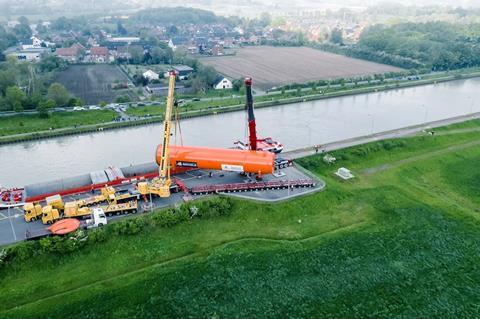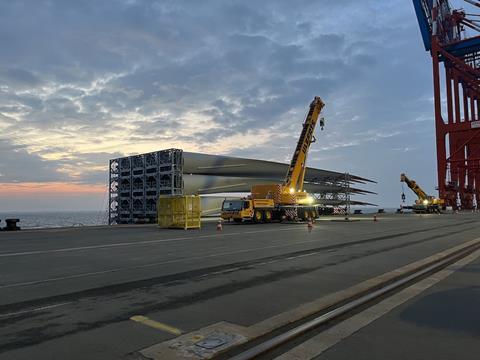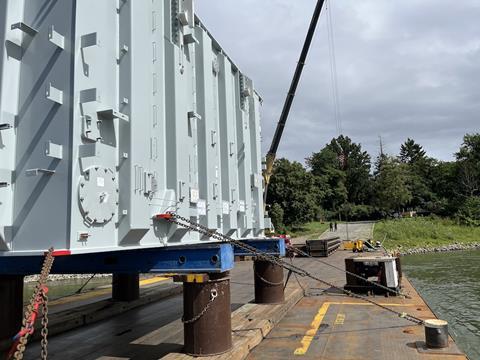Germany’s ageing transport infrastructure has made the movement of heavy and oversize cargoes around the country particularly challenging in recent years, with long waits for permits commonplace. However, recent developments, including updated transport regulations and a massive infrastructure spending package, should spark improvements. Daniel Searle reports.
“It’s quite a challenge for the heavy pieces to go by road,” explained Iris Müllejans, managing partner, director at Rolf Riedl. “The infrastructure in Germany is not the best: a lot of bridges need investment, and there have also been major floods in some regions. Working out routes involves a lot of detours and bridge calculations.”

The process for obtaining permits is a particular headache, she noted, with the company having to wait five months to get clearance to provide services for the conversion of the Mainova coal plant in Frankfurt am Main to a natural gas facility. “There are great, supportive people working in this sector, but not enough of them,” she said. “In Hamburg, sometimes a three-month backlog builds up of permit applications.”
Andreas Menzel, managing director Germany and Benelux at Trans Global Projects (TGP), shared that sentiment: “Operating in Germany does come with its set of challenges. One significant challenge is regulatory compliance and obtaining permits, which can be complex and time-consuming. However, efforts are being made to improve this process, with ongoing discussions to streamline the permit process and ensure compliance with local regulations.
“Another challenge is navigating logistical complexities such as bridge load capacities, road inclinations, and infrastructure constraints, particularly for oversized and heavy equipment. TGP addresses these challenges by implementing robust risk mitigation strategies, optimising route planning, and leveraging local expertise.”
Anna Ude, regional head of sales for Central Europe at deugro, went into further detail: “Germany is facing a series of persistent and increasingly complex challenges in transporting oversized and heavy lift (OSHL) cargo. These challenges are primarily driven by infrastructure limitations and regulatory hurdles, but also increasingly by effects of climate change on inland waterway transport caused by low water levels, for example.
“From roads and motorways in bad condition to cracks in bridge structures and the collapse of the Carola Bridge in Dresden on September 11, 2024, Germany’s infrastructure has continued to deteriorate in recent years. Over 7,000 km of motorway and around 8,000 motorway bridges are classified as needing renovation. This means not only a high number of construction sites and the associated traffic jams and bottlenecks, but also high risks when transporting particularly large and heavy loads crossing these bridges,” Ude added.
“Many key corridors are affected by structural restrictions that limit axle loads or clearance heights, which directly impacts the planning and execution of heavy lift transports. Port infrastructure, while generally strong, is under increasing pressure from larger volumes and project cargo with non-standard handling requirements, which adds to scheduling complexity and cost management.”
However, the future is looking brighter.

On the regulatory front, during March 2025, it was confirmed that new rules and regulations governing heavy and abnormal transport in Germany would come into force on July 1 following concerted pressure and criticism from hauliers and wider industry.
The European association of abnormal road transport and mobile cranes (ESTA) said that the changes were published in the Federal Gazette on March 10 in an attempt “to facilitate and accelerate oversized and heavy goods transport” and will include increased flexibility for loads that are slightly undersized by dimension or weight. The association said that, previously, loads that were even slightly under the dimensions as described on their permit ran the risk of having their permits declared null and void – something that has been a great source of frustration as a marginally smaller load does not pose any increased safety or environment risk.
The changes have been long demanded by German industry leaders through the lobby group Verbändeinitiative Großraum und Schwertransporte (VI GST) whose founding members include ESTA and German association BSK.
Other amendments include: the introduction of a guideline of two weeks for permit application processing by responsible federal and state authorities; bringing forward the start of night driving to 20:00 hours from 22:00 hours to increase flexibility; and enabling the transport of divisible loads up to a maximum weight of 40 tonnes on oversized and heavy transport empty runs to make better use of existing truck capacities. ESTA noted that the language rule – that drivers of abnormal and heavy loads in Germany must be able to speak German – has not been changed.
Fiscal package
Moreover, steps have been taken to kickstart Germany’s fragile economy, which has been beleaguered by high energy costs in the wake of Russia’s invasion of Ukraine. In March, the government approved a sweeping EUR500 billion (USD559.4 billion) fiscal package that loosens its rigid debt brake – a constitutional mechanism introduced in 2009 to cap Germany’s structural deficit at 0.35 percent of GDP – creating space for infrastructure investment, defence spending and support for state governments.

Part of a fund approved by the German government this year will go towards improving the country’s transport infrastructure, explained Menzel: “The coalition government of CDU/CSU and SPD agreed on a new EUR500 billion Sondervermögen (special fund) to be deployed over the next 10-12 years. This will focus on a wide range of investments including transport infrastructure – this will cover the modernisation and expansion of ports, roads, railways, and inland waterways, which are vital for handling high-volume and oversized cargo efficiently. These improvements will strengthen Germany’s role as a logistics hub and support complex supply chains, such as those in the wind energy sector.
“Despite the current need for upgrades, Germany continues to offer a robust infrastructure network that is a significant advantage for businesses,” Menzel said. “The country’s extensive storage and quay capacities – especially in strategically-located ports – play a crucial role in supporting project logistics, particularly for wind energy supply chains and the management of oversized cargo. The new Sondervermögen fund will enable essential investments that further enhance these strengths, ensuring Germany’s infrastructure remains competitive and future ready.
”This investment is most welcome, added Müllejans: “We want the government to think like a company. If you want to keep Germany exporting goods, while importing goods for the country to build factories, you need to keep heavy lift corridors clear and free.”
This is an extract from HLPFI’s Germany report, which can be seen in full in the July/August 2025 edition.
















